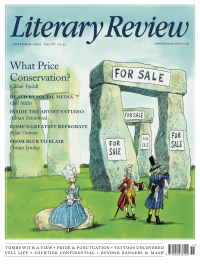Jane O’Grady
Hope Dies Last
Life is Hard: How Philosophy Can Help Us Find Our Way
By Kieran Setiya
Hutchinson Heinemann 240pp £16.99
Philosophia (‘love of wisdom’) began in the sixth century BC as speculation on the nature of the cosmos. The questions that the early philosophers formulated, and the conceptual frameworks they created for answering them, engendered what we now call the sciences. These soon split off from philosophy; a few years ago, Stephen Hawking announced (to wide agreement) that philosophy is dead because science has superseded it. Yet this not only ignores philosophy’s perennial task of digging under, diagnosing and clarifying preconceptions and confusions in other fields; it also overlooks how, in the fourth century BC, philosophy embraced what Socrates called ‘human matters’ – right and wrong, courage and cowardice, the nature of beauty, knowledge and government. Of its two main strands, the metaphysical and the ethical, it is the latter, addressing the practical questions of how life should be lived at an individual and a societal level, that predominates in books of popular philosophy. Unfortunately, though, many of these avoid complexity, cosying along their readers and reducing philosophy to hazy, consolatory musings on life’s meaning, a sort of pseudo-intellectual substitute for therapy and mindfulness sessions.
From its title, Kieran Setiya’s latest book sounds as if it might be of that ilk. It was written during the coronavirus pandemic, though the author tells us that he had already been contemplating writing such a book as a way of coping with incessant, irremediable pain. Autobiographical as well as philosophical, it includes anecdotes and literary references, along with a varied cast of characters: Barthes, Simone Weil, Dostoevsky, Homer and Woody Allen, among others.
The phrase ‘the meaning of life’ originated, Setiya says, with the ridiculous fictional philosopher Diogenes Teufelsdröckh (‘God-born Devil’s Dung’) in Thomas Carlyle’s parodic novel Sartor Resartus of 1834. None of the ancient Greek, Stoic, medieval Christian or Enlightenment philosophers, contends Setiya, actually tackled the question of life’s meaning,

Sign Up to our newsletter
Receive free articles, highlights from the archive, news, details of prizes, and much more.@Lit_Review
Follow Literary Review on Twitter
Twitter Feed
It wasn’t until 1825 that Pepys’s diary became available for the first time. How it was eventually decrypted and published is a story of subterfuge and duplicity.
Kate Loveman tells the tale.
Kate Loveman - Publishing Pepys
Kate Loveman: Publishing Pepys
literaryreview.co.uk
Arthur Christopher Benson was a pillar of the Edwardian establishment. He was supremely well connected. As his newly published diaries reveal, he was also riotously indiscreet.
Piers Brendon compares Benson’s journals to others from the 20th century.
Piers Brendon - Land of Dopes & Tories
Piers Brendon: Land of Dopes & Tories - The Benson Diaries: Selections from the Diary of Arthur Christopher Benson by Eamon Duffy & Ronald Hyam (edd)
literaryreview.co.uk
Of the siblings Gwen and Augustus John, it is Augustus who has commanded most attention from collectors and connoisseurs.
Was he really the finer artist, asks Tanya Harrod, or is it time Gwen emerged from her brother’s shadow?
Tanya Harrod - Cut from the Same Canvas
Tanya Harrod: Cut from the Same Canvas - Artists, Siblings, Visionaries: The Lives and Loves of Gwen and Augustus John by Judith Mackrell
literaryreview.co.uk